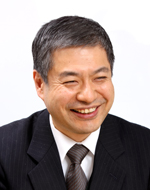2010/05/10
Changing the industry using information dependability
Professor Shuichi Sakai
(Department of Information and Communication Engineering)

Professor Sakai is a researcher in computer architecture. Computer architecture is a research field interfacing “information” and “physics” in which you directly come in contact with the essence of information processing systems and consider what instruction sets and functions are in place, in what size, and what kind of controls are used. His research focuses on integration technology to enable dependability, combination of reliability/safety and security, as well as an existing need for high speed and power saving by incorporating the perspective of “dependable.”
Dependability of information systems is critical since information systems are lifelines directly linked with our lives and assets. In order to ensure system dependability, it is necessary to individually approach processor, OS, and applications at each level and verify them as an integrated system. Professor Sakai focuses on “research to create dependable processor that will be the most common basis of information systems.” From such standpoint, he developed architectures to prevent soft and timing errors and dynamically recreate a circuit by bypassing a point of failure when a circuit partially breaks, and researches ultra dependable VLSI that increases reliability even when there are design errors. Professor Sakai plays a leading role in this research field.
Professor Sakai envisions “cultural creation information processing systems” as one part of “post-dependable information processing” and aspires to make a paradigm shift of industrial structure in 10 to 20 years from now with new architectures and networks that integrate technical and non-technical values. He is famous for both science and arts, which will accelerate the activities in this research and he says that changing industrial structure is an important role of information science and technology. Professor Sakai has close contact with foreign researchers and his perspectives for future visions are extremely unique.

